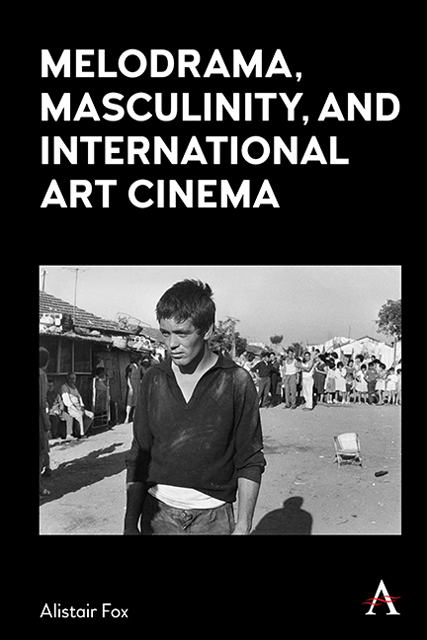Book contents
- Frontmatter
- Dedication
- Contents
- List of Figures
- Preface
- Acknowledgments
- Introduction
- Chapter 1 Italian Neorealism and the Emergence of the Male Melodrama: Vittorio De Sica’s Bicycle Thieves (1948) and Umberto D. (1952)
- Chapter 2 The Migration of Male Melodrama into Non-Western Cultures: Satyajit Ray’s The Apu Trilogy (1955–59) and “Fourth Cinema”
- Chapter 3 Hollywood Melodrama as a Vehicle for Self-Projection: Vincente Minnelli’s Tea and Sympathy (1956) and Home from the Hill (1960)
- Chapter 4 The Political Turns Personal: Neo-Neorealism and Pier Paolo Pasolini’s Accattone (1961)
- Chapter 5 Personal Cinema as Psychodrama: Ingmar Bergman’s Wild Strawberries (1957), Winter Light (1963) and Hour of the Wolf (1968)
- Chapter 6 François Truffaut and the Tyranny of Romantic Obsession: The Soft Skin (1964), Mississippi Mermaid (1969) and The Woman Next Door (1981)
- Chapter 7 Figuring an Authorial Fantasmatic: Jacques Demy’s The Umbrellas of Cherbourg (1964), A Room In Town (1982) and Parking (1985)
- Chapter 8 Rainer Werner Fassbinder and the Emergence of Queer Cinema: The Merchant of Four Seasons (1972), Fox and His Friends (1975) and In a Year with 13 Moons (1978)
- Chapter 9 Visual Aestheticism and the Queer Prestige Melodrama: Call Me by Your Name (2017) and Luca Guadagnino’s Desire Trilogy
- Conclusion
- List of Films Cited
- Select Bibliography
- Index
- Frontmatter
- Dedication
- Contents
- List of Figures
- Preface
- Acknowledgments
- Introduction
- Chapter 1 Italian Neorealism and the Emergence of the Male Melodrama: Vittorio De Sica’s Bicycle Thieves (1948) and Umberto D. (1952)
- Chapter 2 The Migration of Male Melodrama into Non-Western Cultures: Satyajit Ray’s The Apu Trilogy (1955–59) and “Fourth Cinema”
- Chapter 3 Hollywood Melodrama as a Vehicle for Self-Projection: Vincente Minnelli’s Tea and Sympathy (1956) and Home from the Hill (1960)
- Chapter 4 The Political Turns Personal: Neo-Neorealism and Pier Paolo Pasolini’s Accattone (1961)
- Chapter 5 Personal Cinema as Psychodrama: Ingmar Bergman’s Wild Strawberries (1957), Winter Light (1963) and Hour of the Wolf (1968)
- Chapter 6 François Truffaut and the Tyranny of Romantic Obsession: The Soft Skin (1964), Mississippi Mermaid (1969) and The Woman Next Door (1981)
- Chapter 7 Figuring an Authorial Fantasmatic: Jacques Demy’s The Umbrellas of Cherbourg (1964), A Room In Town (1982) and Parking (1985)
- Chapter 8 Rainer Werner Fassbinder and the Emergence of Queer Cinema: The Merchant of Four Seasons (1972), Fox and His Friends (1975) and In a Year with 13 Moons (1978)
- Chapter 9 Visual Aestheticism and the Queer Prestige Melodrama: Call Me by Your Name (2017) and Luca Guadagnino’s Desire Trilogy
- Conclusion
- List of Films Cited
- Select Bibliography
- Index
Summary
This book is the culmination of a long itinerary. It began several decades ago with my study of Thomas More’s Utopia—an attempt on my part to locate the origins of the social idealism that has inflected the evolution of my country. During the course of this investigation, I realized that More’s ambiguous, paradoxical work could not be separated from its author (who appears as a fictionalized character in the account of his imagined ideal society), and neither could the real-life More be separated from the circumstances that were prompting him to write the book in 1515. Intrigued by this connection between an author and his work, I extended the scope of my investigations to cover the whole of the sixteenth century in England, looking first at the way fiction was used to address political issues in the reigns of the first two Tudor monarchs, and then the social and psychological purposes of the extensive imitation of Renaissance Italian literary sources that took place in England during the reign of Queen Elizabeth I.
In the course of these investigations, I discovered that various strategies of imaginative displacement were regularly being deployed in this literature, which led me to conduct further enquiries into what was motivating such a process, and what its functions were. The answers began to suggest themselves to me as a result of daily interchanges I had while a Visiting Fellow at All Souls College, Oxford, during 1987–88, with scholars like the anthropologist Rodney Needham and the psychoanalyst, translator and musicologist Alan Tyson, who pointed me in the direction of Sigmund Freud’s speculations on dreams and dreaming. Upon reading Freud’s crucial work, I quickly recognized that the process Freud ascribed to dreams involved mechanisms of displaced fictive invention that were similar to those I had been encountering in my studies of Tudor literature.
After a spell as a senior administrator in my home university, which deepened my insights into what Thomas More called “politic worldly drifts,” I decided to see whether the same mechanisms were operating in contemporary forms of fictive representation, and whether fiction was being used for the same purposes, particularly with reference to the literature and cinema of my own country, New Zealand.
- Type
- Chapter
- Information
- Melodrama, Masculinity and International Art Cinema , pp. xi - xivPublisher: Anthem PressPrint publication year: 2022



